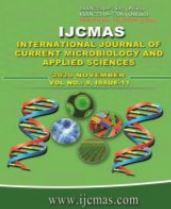


 National Academy of Agricultural Sciences (NAAS)
National Academy of Agricultural Sciences (NAAS)

|
PRINT ISSN : 2319-7692
Online ISSN : 2319-7706 Issues : 12 per year Publisher : Excellent Publishers Email : editorijcmas@gmail.com / submit@ijcmas.com Editor-in-chief: Dr.M.Prakash Index Copernicus ICV 2018: 95.39 NAAS RATING 2020: 5.38 |
The use of resource management technologies such as zero tillage, which can affect the soil properties, can restore soil health that is degrading at a rapid pace due to intensive agriculture, inefficient and imbalanced use of fertilisers, high-yielding crops, the use of heavy machinery, excessive tillage, etc. The health of the soil can be measured by the capacity of microorganisms that can act as early warning signals. To improve soil quality, zero tillage is recommended globally and has significant effects on soil microbial communities. We do, however, know much less about biological influences than about the physical and chemical properties of the soil. Tillage helps to establish a favourable soil condition for plant growth, but it modifies the soil ecosystem and microbial communities responsible for organic matter decomposition and nutrient cycling on a long-term basis. The intensity of tillage has different effects on the biological properties of soils through changes in soil habitat, affecting soil porosity, soil water quality, distribution of residues and availability of substrates, etc. Zero tillage can enhance the structure of the soil, soil temperature and water holding capacity, thereby improving the microbial properties of the soil. By improving soil structure, nutrient status, water holding capacity and, eventually, all soil microbial communities and their activities, this improves soil quality. Long-term zero tillage practises can therefore improve the soil's microbial properties.
 |
 |
 |
 |
 |